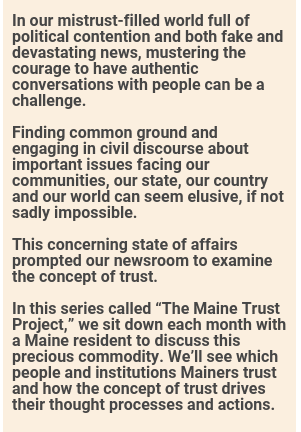When Maureen Hassett’s husband, Steve, came home one day after work and announced that he thought he could start his own business making composite parts for boat builders, she thought he was nuts. “I was like, ‘No way!’ ” she said. “How would we do that? I didn’t know how we’d have security.”
Their kids were 4 and 6, and except for odd jobs here and there, she had stopped working so she could be home with them. She turned to her father-in-law, thinking he’d support her argument that starting a business was too risky, but he said he thought his son could do it.
She remained unconvinced, until one day listening to her husband talk in detail about how he’d run the business. Not having worked with him in a business setting before, she didn’t realize the depth or complexity of his knowledge of the boat-building business. “He totally impressed me,” she said. “I said (to myself) maybe he really does know what he’s doing.” He also assured her that no matter what happened, even if the business didn’t get off the ground and he had to shovel snow to support their family, they’d be OK.
 She decided to trust her husband. In 1999 the couple launched Custom Composite Technologies, now based in their own facility in Bath instead of their Brunswick home.
She decided to trust her husband. In 1999 the couple launched Custom Composite Technologies, now based in their own facility in Bath instead of their Brunswick home.
Their first customer was a former employer of Steve’s, Eric Goetz, a Rhode Island-based builder of high-profile racing vessels and yachts. “He really had faith in us,” she said. “He just trusted us that we could take it off, and I think that really boosted my confidence. If he believes in us, and he has a pretty phenomenal company, you know, maybe he’s seeing something I’m a little afraid to see right now.”
In short order, their reputation as a trustworthy business that delivered an excellent product brought them success within and outside the boat-building industry. In 2008-09, just as the economy was melting down worldwide, they got a commission to fabricate and install 18 fiberglass sculptures for the internationally acclaimed Zaha Hadid Architects.
With that commission and plenty of boat-related work, they were riding high. “We each thought: We’ve arrived. This is it.” That year, 2009, was their best, she said. But by the time 2010 rolled around, no more contracts were coming in, and they weren’t prepared. “We were naive. We thought we were in this protected little bubble: Things are so good, they can’t get bad,” she said.
But they could, and they did. They had no financial reserves. “We just didn’t put away for a rainy day because we thought it would just keep coming in,” she said. They dropped from a staff of 13 to five and kept in constant contact with their local banker and their advisor at Maine Small Business Development Centers, who not only provided great advice but a lot of moral support. And Steve worked the phones all the time, calling former and current customers, then calling their friends.
Making cold calls like that to everyone they knew and to a number of people they didn’t was hard, but they weren’t giving up, she said. They trusted they would figure out how to keep the company going. But trusting that the company would survive didn’t make going through it easy. “Sometimes you’re crying. Sometimes you’re stomping your feet. Sometimes you’re quitting, (then) you’re coming back,” she said.
Little by little they began to regain ground, and as they did, they began approaching their business differently. “Sometimes you’ve got to go through things to know how to do it better,” she said. Where before they hadn’t managed their money as well as they could have, they trusted their business advisors’ advice to reduce debt and maintain a savings account.
And because they made those changes, this time they have reserves and the experience of going through the fire, so they are better prepared to weather the coronavirus upheaval, she said. But there is still uncertainty: How long will this last? Will customers be willing to spend or will they hold back?
When her husband was making his argument for starting their business, he assured her that no matter what happened – even if the business failed – they’d always be OK. She trusted that then, and she trusts it now. “I think what we learned is that the other person would always be there no matter what,” she said. “We just trusted … (that) even if other things didn’t work out, we were going to get to some other side together.”
Q&A
Who meets your definition of trust?
Maureen: My family. They’re there when I need them to be there. They help pull me through difficult times, and encourage me.
Who doesn’t meet your definition of trust?
Maureen: People who don’t do what they say they’re going to. In business, for example, you develop relationships with suppliers and others based on trust: that they’ll deliver what they say they will and on time; that your employees will show up when they’re supposed to.
What breaks trust for you?
Maureen: When people don’t do what they said they would — like someone who doesn’t pay their bill. Also, when people aren’t being who they presented themselves to be. Maybe they say bad things about someone when that person isn’t around, or gossip. I would have a hard time being able to trust someone who does that.
Can broken trust be healed and if so, what has to happen for healing to take place?
Maureen: I think so. I think people can come to realizations or understandings and then change. But for healing, you have to be able to see the change in that person, and see that it sticks.
Has your definition of trust changed over the years?
Maureen: Yes, I think I’m more open-minded and understanding. I don’t think I had that awareness as much when I was younger. I’m also more aware that if somebody does something that damages trust, I’m probably still going to be OK. I’m not going to be as hurt by that breaking of trust or take it as personally as I might have when I was younger. I guess that comes with more maturity.
Do you think the cultural definition of trust has changed over the years?
Maureen: I don’t know about that. I do think that in years past, it seemed like there was more trust. It’s different today. One of the things I think about is social media. You wonder sometimes if people are being truthful when they post things. If they’re presenting things in a way that is not really honest about what’s going on, or is selective. That goes for the news, too. Are we getting accurate news?
What worries you?
Maureen: Before the virus epidemic, I would have said opioids, but now it’s the virus, of course. I take my temperature all the time. My husband takes his. I worry about my kids in this. I’m worried about our guys in the shop. From a business perspective, I sometimes go into little panics about what might happen. We get supplies from China — but will we be able to? How will that hit us?
What inspires you?
Maureen: People who have courage. Like social workers and healthcare workers who are risking themselves right now to help others. Or those who are helping the homeless. And people who have the courage to take care of themselves, if that’s their challenge, or to ask for help.
What issues do you think are important today?
Maureen: Of course, the safety of everyone. Getting help for the small businesses and people who work for themselves. Beyond the immediate concerns caused by the coronavirus situation, politics are a mess. I hope the world eventually gets to feel safe again, and that there’s less polarity and more people coming together and respecting each other even if they have differing opinions or perspectives.
Get to know Maureen Hassett
Age: 55
Hometown: Brunswick
Religious affiliation: Raised Catholic but no longer practicing
Political affiliation: Republican
How she describes herself: I’m active. I like to ski and walk. I’m compassionate and understanding, and approachable. I like to see myself as open-minded. I try to see the other person’s point of view.
How she defines trust: It’s a willingness to be humble enough to be vulnerable with others. In my life, trust starts with me. By allowing people to see my own struggles, weaknesses and faults, I’m trusting that those won’t be used against me. So if I give trust to people, then they are more likely to give trust back.







